 |
| First Lady Patience Jonathan yesterday as she received her National Electronic Identity Card in Abuja. |
News | Entertainment | Politics | Music | Fashion | Sports | Technology | Education | Celebrity Gists
Thursday, 20 November 2014
Photo: First Lady Received National ID Card
David Mark shuts down National Assembly till November 25th
The IG of police has also been ordered to appear before the House to explain what happened today
Source: Linda Ikeji
Teargas at the National Assembly: Speaker finally gains access into House
Speaker of the House of Reps Aminu Tambuwal has finally gained access
into the House Chamber. There was chaos outside the Assembly complex
this morning as police tried to prevent him and other lawmakers from
entering the complex. Some had to scale the gates after all entry points
were sealed off leaving only one open where many were thoroughly
frisked and some turned back. There are allegations that most of the
lawmakers turned back were from the APC. The police at some point even
fired teargas and some lawmakers reportedly fainted.
Tambuwal, who had been prevented from driving through the second gate after passing through the first gate of the Assembly complex was smuggled into the Chamber by loyalists who overpowered security operatives at the second and third gate. The House has now gone into executive session.
Pictures after the cut...


Tanbuwal after being Tear-Gassed

Tear Gas all over National Assembly
Tambuwal, who had been prevented from driving through the second gate after passing through the first gate of the Assembly complex was smuggled into the Chamber by loyalists who overpowered security operatives at the second and third gate. The House has now gone into executive session.
Pictures after the cut...


Tanbuwal after being Tear-Gassed

Tear Gas all over National Assembly
Happy 57th Birthday to President Goodluck Ebele Jonathan
This is wishing our president, Dr Goodluck Ebele Jonathan more prosperous years on earth.
Happy Birthday, Sir!
Happy Birthday, Sir!
Heavy SSS presence at National Assembly; lawmakers scale gate into complex (photos)



Source: Linda Ikeji
Friday, 14 November 2014
Child fighter tormented by ISIS
Just two weeks ago, Yasir was regularly strapped into an explosive
vest and handed a pistol, an AK-47 and a radio to stand guard at an ISIS
base in the eastern Syrian city of Deir Ezzor.
Yasir -- not his real
name -- is just 15 and an ISIS child soldier. When we first met, he was
clearly nervous, his hands slightly quivering as he picked up his cup of
tea.
Understandable, given all he has been through and the twisted mental maze he is trying to navigate.
Yasir had followed his
father to be with the al Qaeda-linked al-Nusra Front. When ISIS took
over their area, father and son swore allegiance to ISIS.
"I spent a month without seeing my family or anyone that I knew," Yasir recalls. "It was forbidden to see or speak to anyone."
He says there were about
100 children and for a month they were kept isolated from all that they
knew and loved, and not allowed even to see or speak to their families.
Rather, they were
entrenched in intense religious indoctrination. There were daily lessons
on the violent and radical version of Islam practiced by ISIS.
Rigorous military
training was also a daily feature of their lives. He says: "We used to
crawl under webbing. There was fire above it, and we would be firing our
weapons. We would jump through large metal rings and the trainers would
be firing at our feet and telling us if we stop we will be shot."
He says the trainers
would have them run for 2 kilometers. "I was very careful not to stop
running, I didn't stop, even if I was exhausted, out of breath, I didn't
stop."
ISIS posts videos and pictures on the Internet bragging about its so-called "cubs of the Islamic State."
While there are no firm
numbers on how many children are part of ISIS, the United Nations says
there are confirmed reports of children as young as 12 undergoing
military training.
Yasir admits he missed
his parents. It was the first time he had stayed away from them, but he
says he and the other boys would laugh, joke and talk about their
training.
After a month he was sent home and began to regularly report for duty.
"When we arrived they
gave us guns and the explosive belt and the radio," he says. "We would
get calls from the checkpoints alerting us [when] the ISIS VIPs were
coming. Anyone who wasn't a VIP, we would pick up our guns and stop
them."
But his mother would beg him to leave.
Yasir says: "She would
say that I am too young. 'Please leave, you have nothing to do with
this.' I would tell her that this is the jihad that we all must do."
He says the first time he saw a beheading he didn't eat for two days, repulsed by the scene but not the actual act.
He admits he was afraid the explosive belt he wore would accidentally detonate if he was hit by shrapnel.
He also felt proud, strong and filled with a sense of purpose.
But his father realized
he had to save his son and himself. He decided to defect and tricked
Yasir into leaving with him for Turkey.
Yasir says: "I was
asking him 'why are you doing this? What happened?' My father turned to
me and said they are not on the right religious track."
The Yasir we met appears
to have a gentle demeanor, but he's clearly confused, struggling to
define what is right and wrong, and wrest himself from the psychological
damage ISIS has done.
He initially says he
wants to go back to ISIS because his friends are there, and he defends
some of the strict interpretations of Islam, but he also says: "I am
discovering over time they have no religion."
Toward the end of our interview, he tells us he regrets having joined them.
Yasir has a chance to emerge from the hold of ISIS, to return to the Arabic and math-loving schoolboy he was before the war.
But that is not the case
for the other children firmly in the grasp of ISIS, living under their
rule, easily manipulated and lured toward the terrorist organization.
Source: CNN
ISIS Introduces New Currency
The
Islamic State of Iraq and Syria (ISIS) has disclosed plans to mint its
own currency, in a bid to to stay away from the “tyrant’s financial
system”.
Tougher times ahead, says Okonjo-Iweala

Minister of Finance, Dr. Ngozi Okonjo-Iweala
The
Minister of Finance, Dr. Ngozi Okonjo-Iweala, on Thursday said the
country would this month begin to feel the impact of the falling global
oil prices, which started in June.
Consequently,
she said the country needed to brace for tougher times ahead by
reviewing its expenditures and building economic buffers through budgets
that would be based on modest oil prices.
According
to her, sound macroeconomic management is crucial to Nigeria at this
time, while also emphasising the need to plug all revenue leakages.
The
minister spoke in Lagos at the Africa Financial Summit organised by the
Institute of International Finance and Access Bank Plc.
“We
have not seen the impact of the falling oil prices in Nigeria; it will
start this month. We have to drive the non-oil revenue base to be able
to weather the storm that is coming,” Okonjo-Iweala said.
She,
however, said Nigeria was not alone in the coming economic storm,
pointing out that a large number of African countries that relied on
commodity export as the mainstay of their economies would also be
affected by the global fall in the prices of such commodities.
The
minister said the global fall in the prices of export commodities such
as gold, iron ore and agricultural produce such as cocoa, cotton and
coffee was bound to affect most African economies, which relied on
commodity export as the major source of revenue.
Quoting
from the United Nations Conference on Trade and Development,
Okonjo-Iweala said the ratio of export commodity to total merchandise
was very high in a large number of African countries.
According
to her, it is 60 per cent in South Africa; 89 per cent in Zambia and
Ghana; 96 per cent in the Democratic Republic of Congo; and 83 per cent
in Nigeria.
She said based on the 2013
data, 70 per cent of sub-Saharan Africa’s merchandise exports went to
regions that were currently facing slowdown.
Ten
per cent of commodity exports from the sub-Saharan Africa go to the US;
26.5 per cent to Europe; three per cent to Japan; 21 per cent to China;
and three per cent to Brazil, according to the minister.
Consequently,
Okonjo-Iweala said there was an urgent need for Nigeria and other
African countries to explore other means of shoring up their revenues in
the face of the falling prices of export commodities.
She said borrowing to fund annual budgets would not be a better option for most African countries.
“I
strongly urge other African countries to look into other directions. We
need to build our economic buffers. Of course, there will be pressure
to borrow in the face of falling commodity prices, but we cannot afford
to borrow. There is a need to drive domestic resource mobilisation,” the
minister addSource: Punch Online
Another military helicopter crashes in Yola
Another military helicopter crashes in Yola

Another military helicopter crashed last night between Girei & Modibbo near the Federal University of Technology Yola, Adamawa state. Eye witnesses said the helicopter stopped abruptly midair while flying then crashed into a ball of fire. The Nigerian military are yet to say anything about the crash
Lives Lost as Boko Haram attack Chibok again
Boko Haram reportedly launched an attack on Chibok community in Borno state yesterday night November 14th killing several people.
Thursday, 13 November 2014
Nigeria army 'retakes Mubi from Boko Haram'
 A recent Boko Haram video showed fighters parading an armoured vehicle in an unidentified town
A recent Boko Haram video showed fighters parading an armoured vehicle in an unidentified town
The Nigerian army has retaken the key town of Mubi from militant Islamist group Boko Haram, the regional governor told the BBC.
Boko Haram seized Mubi, the second largest town in the
north-eastern Adamawa state, in October, renaming it Madinatul Islam -
City of Islam.It was the biggest town under the group's control.
Residents there said militants imposed Islamic Sharia law and carried out executions and amputations.
Adamawa state governor Bala Ngilari said government forces had recaptured the town, although there was no independent confirmation of this.
Some reports said Boko Haram had withdrawn after looting the town, rather than as the result of direct fighting.
However, Mr Ngilari's chief of staff, Chibudo Babbi, told the BBC Hausa Service that remnants of the group were being flushed out of Mubi by the military.
 Boko Haram leader Abubakar Shekau has declared a caliphate in areas he controls
Boko Haram leader Abubakar Shekau has declared a caliphate in areas he controls
The BBC's Muhammad Kabir Muhammad in Abuja says that if Nigerian troops have recaptured the town, it will be a rare piece of good news from the region for the army.
Many Nigerians, though, may not be quick to celebrate this success, he says, given that many other towns and villages are still under the group's control.
In August, Boko Haram said it had established an Islamic state in areas it controls in north-eastern Nigeria.
Analysts say the group has changed tactics in recent months by holding on to territory rather than launching hit-and-run attacks.
In April, the militants captured more than 200 girls from a boarding school in the town of Chibok, in Borno state.
Countries such as China, France, the UK and US have sent military assistance to help find the girls but they have not yet been rescued.

Source: BBC
Islamic State: 'Baghdadi message' issued by jihadists
 Abu Bakr al-Baghdadi has rarely appeared in public
Abu Bakr al-Baghdadi has rarely appeared in public
Islamic
State has released an audiotape it says was recorded by its leader Abu
Bakr al-Baghdadi, days after reports that he had been killed or
injured.
In the recording, released via social media, the speaker says
IS fighters will never cease fighting "even if only one soldier
remains".Correspondents say the recording appears authentic and recent.
Reports that Baghdadi had been badly injured followed US-led air strikes near the Iraqi city of Mosul last week.
The 17-minute recording makes no direct reference to the air strike, but mentions some developments that have occurred since.
The speaker, said to be Baghdadi, calls on supporters of Islamic State to "erupt volcanoes of jihad" across the world.
He also calls for attacks in Saudi Arabia - describing Saudi leaders as "the head of the snake" - and says that the US-led military campaign in Syria and Iraq is failing.
In the recording, he mentions US President Barack's Obama decision to deploy an extra 1,500 troops to Iraq - a move that was announced after the air strike on Mosul.
There are also new pledges of allegiance from jihadist groups in Libya, Egypt and Yemen that also occurred in recent days.
"O soldiers of the Islamic State... erupt volcanoes of jihad everywhere. Light the earth with fire against all dictators," Baghdadi says.
Islamic State has seized swathes of Syria and Iraq since June, declaring a caliphate over territory it controls.
Source: BBC
Tuesday, 11 November 2014
ISIS after al-Baghdadi: What happens if the terror leader is killed?
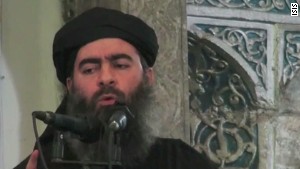
He runs his terror group like a CEO -- with spreadsheets on missions, assassinations and captured assets.
And reports from Iraq's government suggest ISIS leader Abu Bakr al-Baghdadi may have been hit
in airstrikes over the weekend -- though it's not clear whether he was
wounded, whose strikes he may have been hit by and in what part of the
country he may have been struck.
Was ISIS leader hit in airstikes?
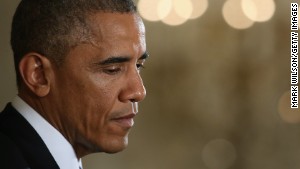 Is Obama's war against ISIS illegal?
Is Obama's war against ISIS illegal?
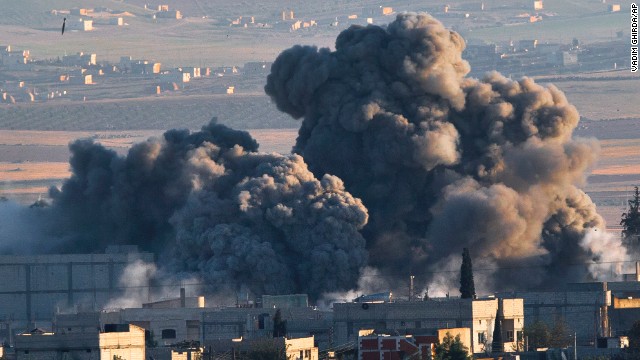 Photos: The ISIS terror threat
Photos: The ISIS terror threat
But if al-Baghdadi is dead, what would happen to the radical Sunni militant group?
Don't expect ISIS to just crumble.
"It will morph, and new
leaders will emerge," retired U.S. Maj. Gen. James "Spider" Marks said.
"In fact, bear in mind that ISIS leadership originated from Saddam's
military. These are very conventionally trained, very professional
leaders."
Odds are al-Baghdadi or
the Shura Council, which handles the group's religious and military
affairs, has planned this scenario in advance.
"ISIS likely has a clear
line of succession," said Lauren Squires of the Institute for the Study
of War. "This is a bureaucratic organization with a deep bench ...
either Baghdadi has signed off on the line of succession himself or the
Shura Council has agreed to a line of succession."
Top two deputies
Al-Baghdadi has a Cabinet
of advisers as well as two top deputies -- Abu Muslim al-Turkmani, who
oversees ISIS' mission in Iraq, and Abu Ali al-Anbari, who is in charge
of operations in Syria, according to the Terrorism Research and Analysis
Consortium.
Both men are veteran Iraqi military officials who served under Saddam Hussein.
"These people who had
previously served in Saddam Hussein's army were extremely brutal because
Saddam Hussein's regime was very brutal," said Peter Neumann of King's
College. "But they also inherited the disciplines and the military
skills that are now benefiting ISIS in its campaign against its
enemies."
Analysts say al-Turkmani could make a strong case to become the leader of ISIS if al-Baghdadi is taken out.
"He would also have had
to have a lot of outstanding qualities either in the political or the
military field, and that certainly makes him a potential contender,"
Neumann said.
Beneath each deputy are
12 governors for both Iraq and Syria. Those governors handle financial,
military, legal, media and intelligence councils, among others.
What's interesting about
the bureaucratic hierarchy of ISIS is that it looks a lot like those of
some Western countries whose values it rejects -- except there's no
democracy involved and there's a council tasked with considering who to
behead.
Another possibility
Then there's Syrian Abu Mohammed al-Adnani, the chief spokesman for ISIS who could also take over the group.
In September, al-Adnani called for ISIS supporters to launch lone-wolf attacks.
Analysts say some of
al-Baghdadi's top deputies were imprisoned with the spokesman at Camp
Bucca, a U.S.-run detention center in Iraq where al-Baghdadi was also
held for at least four years.
"He was able to trust these individuals as sharing his ideology, sharing his hatred for the West.," Squires said.
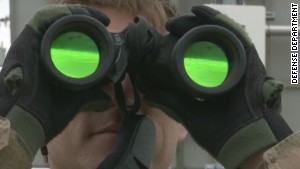 U.S. troops arrive in Anbar province
U.S. troops arrive in Anbar province
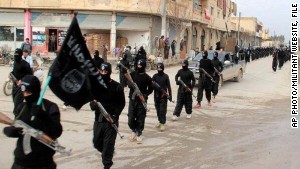 The effort to cut off funding to ISIS
The effort to cut off funding to ISIS
The Shura Council's importance
If al-Baghdadi is still alive, there's one group of people who can take him out even without the use of airstrikes or violence.
The Shura Council is the
religious monitor for ISIS. Not only does it make sure all the local
councils and governors are sticking to ISIS' version of Islamic law, it
has the ability to stand up to al-Baghdadi.
"The Shura Council has
the right to tell Baghdadi to go if he's not adhering to ISIS' religious
standards," said Jasmine Opperman of the Terrorism Research and
Analysis Consortium. "It would most probably never happen, but the fact
that it's possible indicates the council's prominence."
She said the recent
beheadings of Western hostages James Foley, Steven Sotloff, and David
Haines would have fallen under the Shura council's purview.
On top of that, Opperman
said, the Shura Council also has the power to censure the leadership
for running afoul of its interpretation of Sharia law.
But what happens if
al-Baghdadi dies night just be hypothetical for now. While some Iraqi
officials say the ISIS leader was wounded in an airstrike, U.S.
officials say they can't confirm whether al-Baghdadi was hit at all.
Court jails captain of capsized South Korean ferry to 36 years
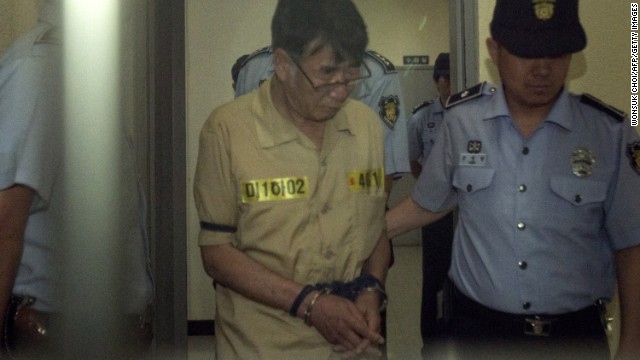
Lee Joon-Seok, the captain widely derided by families for leaping to safety while the hundreds of people remained inside the sinking South Korean ferry, was sentenced Tuesday to 36 years in jail.
Although he was acquitted of murder, Lee was found guilty of violating "seamen's law" and abandonment causing death and injury.
The sentence was the
culmination of a five-month trial. A panel of three judges delivered the
verdict and the sentence for Lee, who was accused of multiple charges
including negligence, abandonment, and murder, for his conduct on the
Sewol ferry that sunk on April 16.
Prosecutors had sought
the death penalty for Lee, alleging that he did not use the available
equipment such as life rafts, life vests and announcements to evacuate
the passengers.
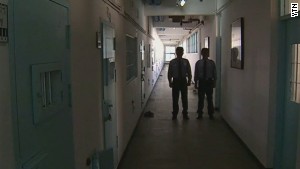 In South Korea, death doesn't mean death
In South Korea, death doesn't mean death
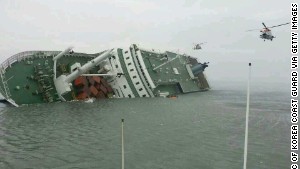 Sewol ferry disaster: 6 months of pain
Sewol ferry disaster: 6 months of pain
 Angry families speak out at ferry trial
Angry families speak out at ferry trial
Park Gi-ho, the ferry's
chief engineer was found guilty of murder and sentenced to 30 years. The
remaining 13 crew members were sentenced five to 20 years.
The verdict was met with
outrage by families of the victim, who gathered outside court asking for
an appeal and calling for the death penalty for the crew members.
More than 300 people died
after the ferry capsized on the southwestern coast of South Korea in
April. Almost 250 of them were suburban high school students on their
way to a field trip.
Nine people remain missing. The government ended the underwater search on Tuesday after searching for about seven months.
"Conditions of the search
has reached dangerous situation, for instance like the collapse of
compartments within the ferry," said Lee Ju-young, the South Korean
Minister of Oceans and Fisheries. "As the winter season approaches,
conditions in the sea are deteriorating.
He said the chances of the finding the last victims were waning and that the sea conditions could cause casualties.
The ferry will be
sealed, but the decision on a salvage operation will be made after
considering various conditions and consulting with the families and
experts.
Crew scorned and blamed
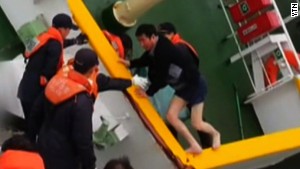
The image of Sewol ferry captain Lee Joon-seok being rescued in his shorts enraged South Korea.
Damning photos of Lee,
dressed in a shirt and underwear, jumping into the arms of rescuers
triggered widespread revulsion. While, there's no international maritime
law that says a captain has to go down with his or her ship, his
actions drew widespread criticism and it cemented in many people's mind
that the captain had prioritized his safety over that of his passengers.
Even South Korean President Park Geun-hye chimed in, calling the actions of Lee and his crew as "akin to murder."
Lee has apologized numerous times, saying his actions were not intentional.
"I was stunned by the
accident and I lost my ability to make decisions. I swear I never
thought passengers should be left dying in order for me to make it to
safety first."
Lee and three other crew members were charged with murder in an emotional trial that began in June.
Several of the survivors
testified that when the ship's troubles began, they were instructed
over the announcement system to stay put rather than to evacuate. The
ship eventually capsized, trapping hundreds of passengers inside.
Lee's defense has
maintained that the captain had only been at the helm of the ship for
six days and that he was not willfully negligent.
"The defendant comes to
understand the responsibility and is relying on psychological medication
and also sleeping pills," his lawyer, Lee Gwang-jae told the court
earlier this month. "He has an apologetic mindset and is living everyday
as if walking on a thorny field, fearing that what he has done may sbe
passed onto his family."
Lee had not been
steering at the time when the ship listed that April morning. Lee told
the court he was in his room, smoking and changing his clothes when
trouble began on the ship. He acknowledged that he knew that the person
who was steering did not have the proper skills.
"I failed to take the necessary measures for passengers to leave the ship," Lee said in court.
 Ferry CEO charged with negligence
Ferry CEO charged with negligence
 Ferry victim's haunting cry for mom
Ferry victim's haunting cry for mom
 S. Korean President apologizes
S. Korean President apologizes
"I reflect and apologize
to the victim's families -- to those who lost their beloved sons and
daughters. To the fathers, I'd say: 'I've committed a sin, worthy of
death.'"
A fair trial?
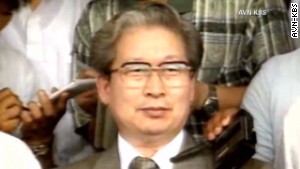 Body identified as suspect ferry owner
Body identified as suspect ferry owner
There have been some
concern that the Sewol crew members were being publicly demonized,
affecting their chances for fair trial. Their trial was so highly
charged that some lawyers refused to represent Lee.
Investigators have said
that a vast amount of cargo, more than double the ferry's limit, and the
failure to tie it down properly were partly responsible for the
capsizing of the Sewol.
"I am concerned that those who are more responsible are shifting blame to the defendant," said Lee's defense attorney, when the trial began.
The operators of the Cheonghaejin Marine Co, which ran the ill-fated ferry are also facing trial.
South Korea's Yonhap
News Agency reported that prosecutors are seeking a 15-year prison term
for Kim Han-sik, chief executive officer of the company, who is facing a
manslaughter charge.
The Sewol disaster
caused widespread outrage in South Korea over lax safety standards and
the failure to rescue more people as the ship foundered.
Source: CNN
Heartbreak as 47 Students are Killed in Savage Attack

Governor Ibrahim Gaidam
Yobe State Governor, Alhaji Ibrahim Gaidam, has expressed heartbreak
over Monday’s bomb attack at a secondary school in Potiskum, even as he
condemned the emergency rule in the state, saying it has increased
terrorist attacks rather than reducing them.
Barely one week after a suicide bomber detonated a bomb during a Shiite procession in Potiskum, the commercial nerve centre of Yobe was again thrown into mourning following a suicide attack on Monday morning at Government Comprehensive School, which left 47 dead and 79 others injured.
Barely one week after a suicide bomber detonated a bomb during a Shiite procession in Potiskum, the commercial nerve centre of Yobe was again thrown into mourning following a suicide attack on Monday morning at Government Comprehensive School, which left 47 dead and 79 others injured.
Briefing the press on the attack, the Yobe Police Command said a
suicide bomber who disguised as a student detonated the explosive at the
school’s assembly ground at 7.45 am.
Police bomb experts were mobilised to the crime scene while the victims were taken to hospitals, police officials said.
Eyewitnesses said the students were converged for the morning assembly
when the incident occurred in the school said to be one of the densely
populated boarding schools for boys, located very close to the General
Hospital, Potiskum, in the centre of town.
One of the victims of the attack, Mohammed Isa, a student of SS 2E, revealed that the suicide bomber disguised as one of the students after wearing a uniform and was on the queue with them before he detonated a bomb hidden in his bag.
One of the victims of the attack, Mohammed Isa, a student of SS 2E, revealed that the suicide bomber disguised as one of the students after wearing a uniform and was on the queue with them before he detonated a bomb hidden in his bag.
Isa, who spoke to journalists at the General Hospital, Potiskum, where
the corpses were deposited and the injured students taken for treatment,
said: “We were at the assembly ground at about 7.30 am today
(yesterday) waiting for the principal to conduct the service when a loud
bang was heard and all I could see was that I had fallen in pain and
many around me were covered in blood and groaning.”
He said he was assisted to the hospital by good Samaritans who came to
the rescue of the injured students and also loaded the corpses into
vehicles.
Isa explained that it is the tradition of his school for students to
gather at the assembly ground for devotion before dispersing for
lessons, “but the suicide bomber who must have disguised as a student
was with us during the assembly and must have detonated the bomb which
led to the carnage”.
It was further discovered that the school was not well fenced, making it easy for intruders to access its premises.
Following the attack, scores of parents besieged the school to know the
fate of their wards, while others scrambled to withdraw their children
from other schools.
Though no one has claimed responsibility for the attack, it is believed
to have been the handiwork of the terrorist group, Boko Haram.
A resident of the town, Ibrahim Ahmed, who spoke to THISDAY, said:
“There has been pandemonium since 7.45 am in Potiskum when a bomb was
detonated at Government Comprehensive School.
“We heard a big bang and since then the area was cordoned off but
ambulances have been going into the school to pick up corpses and taking
the injured to the hospital.”
He added: “I can tell you all schools in the town have been closed now
as parents have gone to pick their children. There is wailing everywhere
especially around the school where the incident happened.”
Reacting to the suicide bombing, Gaidam called on President Goodluck
Jonathan to explain to the people of the North-east and the entire
country the modalities for the continued imposition of emergency rule
and why it has failed.
The governor, in a press statement by his spokesman, Mallam Abdullahi
Bego, said: “This morning, our state woke up to a very sad and
heartbreaking news of a bomb attack on our young students at Government
Comprehensive School, Potiskum, in which no fewer than 35 students were
killed and many more injured.”
According to Bego, the governor’s thoughts and prayers were with the
parents, teachers and families of the innocent victims of the callous
and reprehensible attack, adding that he was heartbroken and words could
not adequately convey the extent of his remorse and sadness.
He said: “The governor has noted that this is the fifth time in a little over one year when our schools in Yobe State were brutally attacked and students killed. There was Government Secondary School, Damaturu; Government Secondary School, Mamudo; College of Agriculture, Gujba; Federal Government College, Buni-Yadi; and now Government Comprehensive School, Potiskum.
He said: “The governor has noted that this is the fifth time in a little over one year when our schools in Yobe State were brutally attacked and students killed. There was Government Secondary School, Damaturu; Government Secondary School, Mamudo; College of Agriculture, Gujba; Federal Government College, Buni-Yadi; and now Government Comprehensive School, Potiskum.
“Governor Gaidam deeply regrets that all of these dastardly attacks
took place under a climate of emergency rule declared in Yobe, Borno and
Adamawa States by President Goodluck Jonathan.
“In theory, the emergency rule declaration was a signal that more
vigorous steps would be taken to protect the lives and property of
people in the affected states and deploy the full might of the federal
government to restore peace and security.
“Unfortunately, this has not been fully the case. Instead of forcing
insurgents and criminals to flee; the insurgents are forcing innocent
people to flee and making life miserable for everyone.
“Governor Gaidam believes that President Goodluck Jonathan has a very urgent responsibility to explain to the people of Yobe State and people all across the affected states why murderous and callous insurgency and criminal attacks are still on the rise despite the state of emergency."
“Governor Gaidam believes that President Goodluck Jonathan has a very urgent responsibility to explain to the people of Yobe State and people all across the affected states why murderous and callous insurgency and criminal attacks are still on the rise despite the state of emergency."
The governor insisted that it was not just enough for the federal
government to condemn the almost daily rounds of violence, stressing
that urgent action needed to be taken immediately to restore the
fast-waning public confidence by doing whatever it takes to stop the
escalating violence.
He ordered the immediate closure of all public schools around the
Potiskum area until a full review of the situation is undertaken.
He also called on all people of Yobe State to exercise restraint and
continue to pray for the intervention of the almighty Allah.
He assured members of the public that despite the emergency rule in
place, he would continue to do everything within his powers to get the
federal government to do more and also continue to offer his
administration’s support to all the people affected.
The governor directed hospital authorities in Potiskum to provide
immediate medical support to the victims of the school attack free of
charge, adding that some of the victims were referred to the Federal
Medical Centres in Nguru and Azare, and the state government would foot
their medical expenses.
The governor has also directed the Commissioner for Health to monitor
victims and suggest additional measures that might be needed to help
them recover.
Also speaking on the measures taken by the state government to
safeguard students and schools in the area, the Yobe State Commissioner
for Education, Alhaji Mohammed Lamin, said the state had closed down all
schools in Potiskum, pending an improvement on the security situation.
He said 33 students were killed in the blast and 67 others sustained injuries.
In his reaction to the suicide bombing in the secondary school, the president yesterday extended his heartfelt condolences to the government and people of the state on the death of the students.
In his reaction to the suicide bombing in the secondary school, the president yesterday extended his heartfelt condolences to the government and people of the state on the death of the students.
In a statement by his spokesman, Dr. Reuben Abati, Jonathan also
conveyed his “deepest sympathies to all parents who lost their beloved
children in the heinous attack on the school which appears to have been
carried out by a suicide bomber”.
The president condemned the dastardly murder of the students on their
school assembly ground, and promised the grieving parents and people of
Yobe State that the federal government would ensure that all those
responsible for the senseless murder of so many promising youngsters and
the continuing acts of terrorism across the country are brought to
justice and made to pay for their atrocious crimes.
The president similarly assured all Nigerians that in spite of seeming
setbacks, his administration remained fully committed to winning the war
against insurgency and terrorism.
Also, the Indian Prime Minister Narendra Modi yesterday condemned the suicide attack in a boy's school in Nigeria in which dozens were killed.
Also, the Indian Prime Minister Narendra Modi yesterday condemned the suicide attack in a boy's school in Nigeria in which dozens were killed.
In a tweet, the prime minister said: "The attack in Nigeria is cowardly
and utterly condemnable. Condolences to the kin of the deceased. My
prayers with the injured."
Source: ThisDay Live
Subscribe to:
Comments (Atom)









